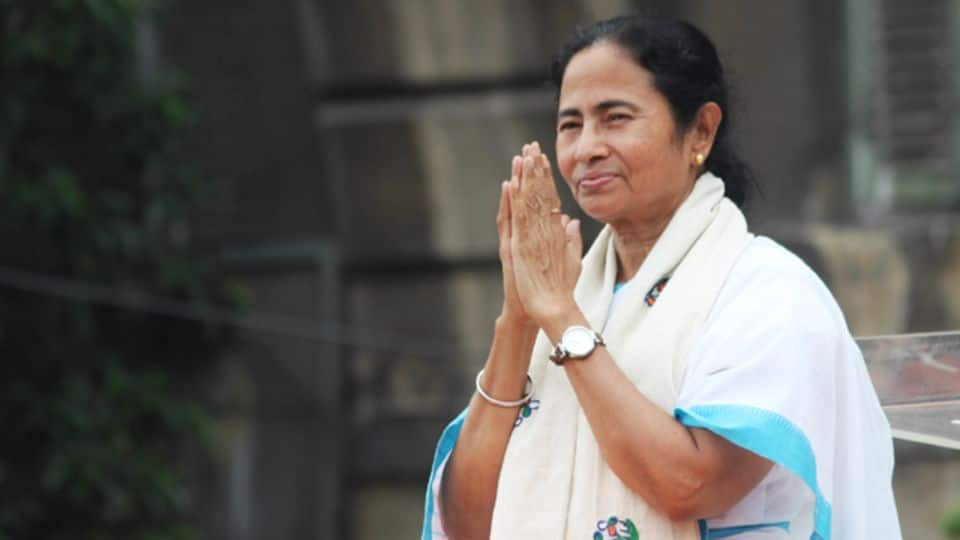
As Mamata Banerjee turns 62, we dissect her 'didi-giri'
What's the story
West Bengal CM Mamata Banerjee evokes a number of emotions: her firebrand politics arouses admiration, her affable personality attracts love, her unpredictability frustrates people while her emotional outbursts induce laughter. However, the indisputable fact is that Mamata can't be ignored. Like Salman is "bhai," Mamata is popularly known as "didi." As she celebrates her 62nd birthday today, let's see what makes her "didigiri" formidable.
Vanity-free lifestyle
Mamata is self-made, with simple needs
Mamata is entirely self-made, with no political genes in her whatsoever. At a young age of 9, she lost her 'refugee' father. Obviously, Mamata isn't a product of dynastic politics. Starting as a young Congressi, she moved up the political ladder. Moreover, even now she has simple needs: she travels in a Santro and wears a white-cotton saree and rubber slippers.
Unpredictability
Mamata's stubbornness exasperates but doesn't diminish her importance
Mamata's unpredictability and principalistic approach is well-known. She often uses her political clout to arm-twist her coalition partners. When her demands/expectations aren't fulfilled, she walks out. In 2001, during NDA-regime, when top-BJP leaders were allegedly found to be involved in shady defense deals, Mamata rescinded her support. In 2012, she pulled out of UPA due to their decision to allow FDI in retail markets.
Criticism
Hell hath no fury like didi (Mamata) scorned!
The fiery CM has what her detractors refer to as extreme intolerance. That Mamata doesn't take kindly to criticism is an understatement. In 2012, a professor was arrested and jailed for sharing a cartoon that satirized Mamata. Steps like banning some English and Bengali dailies attracted public ire. But, Mamata is dismissive of criticism and insists that the media always paints a negative picture.
Mass appeal
Mamata is the single-most powerful mass leader in Bengal today!
Though her populist policies, minority politics and "doles" have attracted criticism, her ability to pull in crowds is unquestionable. Reportedly, her crowd-pulling capacity surpasses that of former CM Jyoti Basu. For 2016 Assembly elections, a galaxy of leaders, from PM Modi to Congress's Rahul Gandhi descended upon Bengal. Mamata single-handedly countered them with about 150 rallies and roadshows, emerging victorious.
Relatability
What makes Mamata relatable to the masses?
Mamata's self-made persona, simple lifestyle and instinctive outbursts naturally endear her to the crowds. She has slowly cultivated this image of being one with the masses. Further, she is relatable to all age-groups because of her varied hobbies. She draws and enjoys photography. She is the published author of "Poribortan" (Change), "Kobita" (Poems) and "My Unforgettable Memories." Her passionate speeches resonate with the masses.
Obstinacy
Mamata is tenacious about her likes and dislikes
The maverick Bengal leader is clear about her likes and dislikes. Her main objective when she entered politics was the decimation of the left. After three decades, in 2011, she finally achieved her objective with TMC winning over three-fifths of the Assembly seats. In political communication too, Mamata chooses to be for or against an issue leaving little room for negotiation.
Do you know?
Interestingly, scams also didn't affect her popularity
Significantly, during her 2011 regime, many scams were unearthed but Mamata's popularity remained intact. A Narada sting operation showed TMC leaders accepting cash and many senior party-members were named in the Saradha scam. However, Mamata remained unscathed and emerged victorious in the 2016 state elections.
Anti-Modi
Has Mamata emerged as the opposition's anti-Modi face?
Mamata has been consistent in her criticism of the Modi-led government. She confronted them on demonetization, GST and removal of central forces during Darjeeling violence. Now, she has attacked them for distorting history. Unlike Kejriwal, who has mellowed-down, and Nitish, who has joined Modi, Mamata continues to band the opposition and raise her voice. She may have emerged as the opposition's face to Modi!